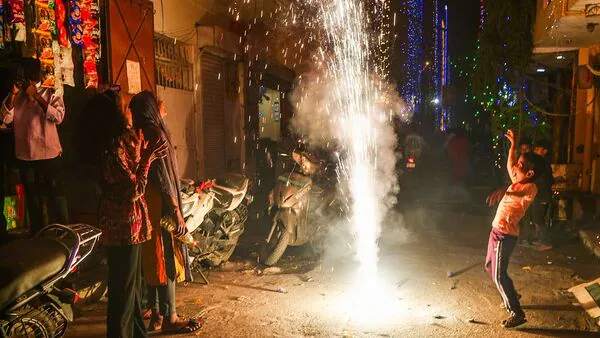
SC Seeks CAQM Affidavit On Pre-Emptive Steps To Prevent Pollution 9 Out Of 37 Monitoring Stations Functioned On Diwali
A bench led by Chief Justice B. R. Gavai and Justice K. Vinod Chandran, while hearing the M. C. Mehta case, emphasised that the authorities should take proactive action rather than waiting for pollution levels to reach the“severe” category, PTI reported.
Also Read | Ixigo's Aloke Bajpai shares GPT-estimated cost to stop stubble burningSenior advocate Aparajita Singh, who is assisting the bench as an amicus curiae, flagged media reports indicating that several air quality monitoring stations in Delhi were not functioning during the Diwali period.
“There are newspapers after newspapers saying that monitoring stations are non-functional. If the monitoring stations are not even functioning, we don't even know when to implement GRAP (graded response action plan)... Out of 37 monitoring stations, only nine were functioning continuously on the day of Diwali,” she said.
The amicus curiae requested the bench to direct the CAQM to provide comprehensive data along with a concrete action plan.
She pointed out that previous court orders had called for preventive measures to be taken in advance, instead of merely responding after pollution levels had already increased.
“The CAQM is required to place on record an affidavit as to what steps are proposed to be taken to prevent the pollution from turning severe,” bench said in its order.
The counsel for the CAQM said that the Central Pollution Control Board is responsible for monitoring data.
However, Additional Solicitor General Aishwarya Bhati assured the bench that the agencies concerned will file the required report.
On October 15, the CJI-led bench permitted the sale and bursting of green firecrackers in Delhi-NCR during Diwali with conditions aimed at balancing tradition with environmental and health concerns.
The court had made it clear that the use of green crackers will be confined to specific hours on Diwali and the day before. The sale of green crackers were permitted from October 18 to 20.
It had also made clear that the relaxation was only on a“test case basis and it shall be only for the period specified”.
Also Read | Delhi AQI: Dr Randeep Guleria shares key tips to reduce air pollution risksSignificantly, the bench had said,“The Central Pollution Control Board, in consultation with the State Pollution Control Boards and their respective regional offices within the districts coming under the NCR, shall monitor the air quality index in their respective jurisdictions starting from October 14, till October 25 and file a report before this court, specifying the air quality of each day indicated hereinabove...”
The CAQM is required to place on record an affidavit as to what steps are proposed to be taken to prevent the pollution from turning severe.“Along with such monitoring, the Regional Offices of the State Pollution Control Boards shall also take samples of sand and water from sites with more density of use for analysis,” the bench had said.
(With inputs from PTI)
Key Takeaways- The Supreme Court is emphasizing proactive measures to prevent air pollution rather than reactive responses. Only 9 out of 37 air quality monitoring stations were operational during Diwali, raising concerns about data accuracy. The CAQM must provide a comprehensive action plan to address pollution ahead of time.
Legal Disclaimer:
MENAFN provides the
information “as is” without warranty of any kind. We do not accept
any responsibility or liability for the accuracy, content, images,
videos, licenses, completeness, legality, or reliability of the information
contained in this article. If you have any complaints or copyright
issues related to this article, kindly contact the provider above.


















Comments
No comment